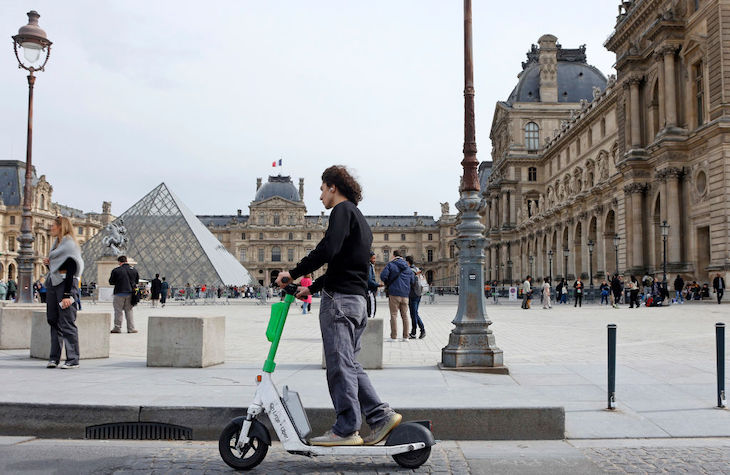An e-scooter revolution is coming to Britain whether the country likes it or not. “The revolution will hurt a little, but it’s necessary,” declared the vice-president of one of Europe’s leading e-scooter rental companies. Christina Moe Gjerde of Sweden’s Voi Technology has said her ambition was to have 50,000 more e-bikes and scooters on the streets of Britain. “You [Britain] are sitting on a gold mine,” said Moe Gjerde. “Get it right and there’s so much potential.”
France was an early advocate of the e-scooter craze but also one of the first to fall out of love with it
Private e-scooters are illegal on English roads but rental companies have been operating rolling trial schemes for a number of years in many towns and cities. The government wants more e-scooters and e-bikes and is encouraging local authorities to initiate more pilots. This roll-out would be regulated with restrictions on parking and speed. Moe Gjerde acknowledged that these two issues are a “problem” and reasons why e-scooters are so divisive.
In March, Nottingham City Council agreed a three-year trial with Dott, a French company, for the introduction of 1,300 rentable e-scooters. Each machine has a unique number that the Council says will make it easier to identity irresponsible users, such those who ride the scooters dangerously or take them outside the city limits.
In contrast, Basildon Council in Essex last week announced they were withdrawing their e-scooters from public use because, in the words of one Labour councillor, they were “causing carnage”. “While e-scooters may offer a green transport alternative, our experience has raised significant safety concerns,” Aidan McGurran explained.
It certainly hasn’t been a good weekend for those in the e-scooter industry. In Australia, a 24-year-old British woman has been charged with causing death by dangerous driving while under the influence. After leaving a bar with a friend, the backpacker collided with a 51-year-old man in Perth last month at around 15 mph. The man died two days later and the friend, who was thrown from the e-scooter, and suffered a fractured skull.
It’s not just on the roads and pavements where e-scooters can be lethal. Last Friday, in the French city of Reims four people were killed when a blaze ripped through a block of flats. On Saturday Reims prosecutor François Schneider revealed that the fire had been started by the battery of an e-scooter.
“Fires caused by this type of battery…are extremely difficult to extinguish, since the cells tend to self-sustain when they burn,” said Schneider. “Which explains the violence and rapid spread of the fire.”
The blaze began in a flat occupied by two teenage boys and their stepfather. The man survived, though with serious burns, while the teenagers died.
France was an early advocate of the e-scooter craze but also one of the first to fall out of love with it. In April 2023, Parisians voted in a referendum to ban rental scooters from the streets five years after their introduction.
I was living in Paris during this period and can confirm that e-scooters, or more precisely the people driving them, were a menace. If they weren’t jumping red lights, they were weaving in and out of pedestrians on the pavements at speeds of up to 15 mph, frequently causing accidents.
The rental scheme had been backed by Paris’s Socialist mayor Anne Hidalgo, but as the numbers of e-scooters soared (there were 20,000 in 2019) so did the accidents. Hidalgo told users to “limit the speed to 20 km/h (12 mph) around the city and to 8 km/h in pedestrianised streets” but few listened. In June 2021, an Italian woman was killed in a hit and run accident, one of 371 incidents involving e-scooters or hoverboards in Paris that year. The three main causes of accidents were refusing to give way, inattention and travelling in the wrong direction.
These incidents continued to rise in 2022, as did the number of deaths – three (among a total of 34 nationwide) – prompting Hidalgo to hold an e-scooter referendum in 2023. Among those who celebrated their demise in Paris was Philippe Juvin, head of the A&E department at the Georges-Pompidou European Hospital.
“The end of self-service scooters is a good thing,” he said, fed up with the number of casualties he and his staff had to treat. “When you fall off a scooter, your face is usually smashed into the pavement, unlike on a bicycle, where you lie on your side.”
Madrid and Melbourne followed the example of Paris last September and banned rental e-scooters from their streets having also concluded that while the machines may be environmentally friendly they’re not very human friendly.
Some revolutions just aren’t worth the hurt.








Comments